HEALTH INFORMATION
Standard Poodles
Health testing is a critical component of preservation breeding. By selecting breeding pairs that have been tested for common genetic disorders, diseases, or risk factors breeders can reduce the likelihood of passing on these traits to future generations, ensuring that the gene pool remains healthy.
PREVENTABLE HEALTH ISSUES – DNA TESTING
Multiple testing labs may be required due to ownership of patents for some tests. The Poodle Club of America Foundation publishes their recommendations here and one of the best resources for poodle related health information is VIPoodle.
Chondrodystrophy and Intervertebral Disc Disease (CDDY/IVDD) – symptoms are shortened legs and disc herniation and only one copy of the gene is needed for 50% of the pups in a litter to be at risk. Visit UC Davis for more information.
Day Blindness/Retinal Degeneration (DB/RD) – also known as achromatopsia, it requires two copies of the gene and affected dogs will have poor vision in bright light; puppies will become blind by around 4 or 5 years old. Visit Wisdom Panel (owns this test) and/or Poodle Club of America for more information.
Degenerative Myelopathy (DM) – a disease of the spinal cord that requires two copies of the gene to show symptoms such as rear feet dragging and wobbling or falling over when walking. Visit VIPoodle for more information.
Gangliosidosis (GM2) – a fatal neurological disease that requires two copies of the gene. This gene is currently being monitored in the standard poodle due to its close relation to the toy poodle. See Orivet and/or Paw Print Genetics for more information.
Neonatal Encephalopathy with Seizures (NEwS) – a fatal disease of the brain that requires two copies of the gene for the pup to show symptoms. Visit Poodle Club of America for more information.
Osteochondrodysplasia (OCD) – currently affects miniature poodles causing dwarfism. With the growth in popularity of intervariety breeding (standard to miniature) to increase genetic diversity, this test may be recommended for standard poodles as well. Visit VIPoodle for more information.
Progressive Retinal Atrophy/Progressive Rod-Cone Degeneration (PRA-PRCD, PRCD) – an inheritable group of diseases that affect the retina; they require two copies of the gene for the dog to show symptoms. Visit VIPoodle, VCA Animal Hospitals and/or Poodle Club of America for more information.
Progressive Retinal Atrophy Rod-Cone Dysplasia 4 (PRA-rcd4) – another form of Progressive Retinal Atrophy that requires two copies of the gene to present symptoms that lead to blindness. Visit VIPoodle for more information.
Von Willebrands (vWD) – an inheritable bleeding disorder that requires two copies of the gene for the dog to show symptoms. Visit Poodle Club of America or Cornell University College of Veterinary Medicine for more information.

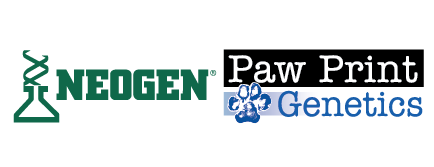

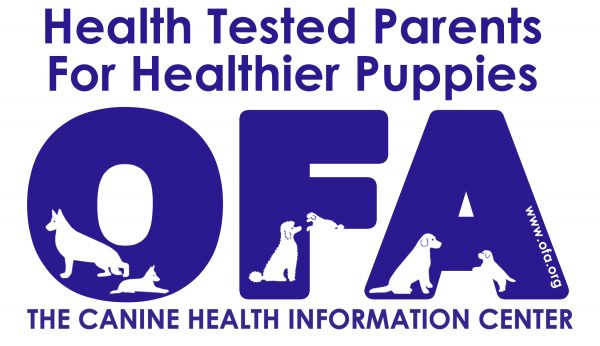
PRE-SCREENING – EXAMINATION HEALTH TESTING
Whether you’re buying for the show ring or to add a companion to your life, health screenings are among the key factors potential owners should consider before choosing a puppy. Increasingly, breeders are turning to health testing to ensure they are doing all they can to create strong matches between dogs that result in healthier puppies. The Canine Health Information Center (CHIC) is a health database sponsored by the Orthopedic Foundation for Animals (OFA). The OFA created CHIC by partnering with parent clubs with the purpose of gathering information on health issues that arise in specific breeds. Standardized health screenings for these common issues were established to help breeders to recognize the best matches for their breeding stock. (akc.org)
Hip Dysplasia – OFA or PennHip evaluation. Visit Orthopedic Foundation for Animals (OFA) and/or DogMD for more information.
Eyes – Annual eye exam by a boarded ACVO veterinary ophthalmologist. Visit Orthopedic Foundation for Animals (OFA) for more information.
Elective (Cardiac, Thyroid, or Sebaceous Adenitis) –
Cardiac – many diseases of the heart can be screened through exam. Visit Orthopedic Foundation for Animals (OFA) for more information. December 2020, OFA revised their recommendations for cardiac screening to include annual exams.
Thyroid – Hypothyroidism is discussed in the next section, Symptomatic Health Screens. Periodic testing is recommended throughout the dog’s lifetime; annually between 2 to 5 years of age and every other year after that. Visit Orthopedic Foundation for Animals (OFA) for more information.
Sebaceous Adenitis (SA) – SA is also discussed in the next section. This is a disorder of the sebaceous glands. False negatives are common if the skin punch biopsy does not gather affected/symptomatic cells since these may be focal rather than extensive in coverage area. Visit Orthopedic Foundation for Animals (OFA) and/or Poodle Club of America for more information.
SYMPTOMATIC HEALTH SCREENS
Addison’s Disease (AD) – also known as hypoadrenocorticism which is insufficient production of adrenal hormones. Visit Poodle Club of America and/or AddisonDogs for more information.
Bloat (Gastric Dilatation and Volvulus) – deep chested dogs are prone to this condition where gas builds up in the stomach causing abdominal pain. In extreme cases, the stomach can rotate and twist, shutting off blood flow and the path for gas to release. Immediate treatment is required. Read the article I authored for United Poodle Association. Visit VIPoodle, Poodle Club of America and/or Veterinary Partner for more information.
Ear infections – poodles tend to grow thick hair even in their ears. Often, hair must be removed to allow air flow and to prevent infections. Visit DogMD for more information.
Hypothyroidism – an under-functioning thyroid that may cause skin conditions, inability to maintain a healthy weight, excessive hunger, irregular heat cycles, excessive coarse coat texture, inability to stay warm, and lethargy. Visit Poodle Club of America or Orthopedic Foundation for Animals (OFA) for more information.
Sebaceous Adenitis (SA) – a disorder of the sebaceous glands that normally lubricate skin and hair follicles causing inflammation, scaling, flaking, thickening of the skin, hair loss and sometimes odor and sores. Visit Poodle Club of America for more information.
VACCINATION PROTOCOLS
links provided by Poodle Club of America
American Animal Hospital Association – Canine Vaccination Guidelines for General Veterinary Practice
Dr. Dodds Vaccination Protocol (and click here for Dr. Dodds site with lots more info!)
SMART AND EDUCATED BUYERS MAKE GREAT OWNERS
We share all of this with our potential families so that you can make smart and educated decisions, and avoid possible pain and regret. Look for sellers who post all test results to OFA – even if they aren’t ideal. Beware of sellers that only post the positive results of certain tests on their site, while omitting any ‘negative’ results. Research BOTH parents and check both of their OFA records for litters you are interested in. When you have done the research, you will feel confident in asking questions about why they chose a specific pairing and/or why they chose to breed a dog with a less than ideal result and how the breeder will guarantee the puppies from those parent(s). We provided links to many reputable resources, but if you don’t find what you are looking for, I am happy to help anyone find the information they seek, no matter where you get your puppy.
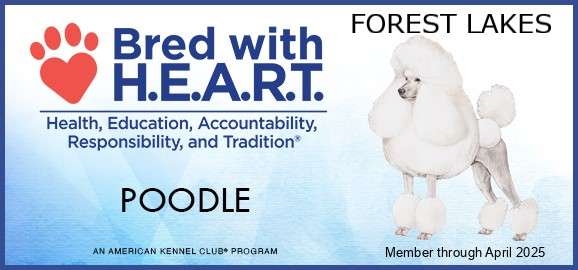
American Kennel Club Bred with H.E.A.R.T. Program:
An AKC Bred with H.E.A.R.T. breeder makes an on-going commitment to the health and well-being of purebred dogs by committing to these program requirements:
- HEALTH: Certifying that their breeding stock is health tested in accordance with the recommendations of their breed’s AKC Breed Parent Club.
- EDUCATION: Promising that they will pursue AKC-provided or AKC-approved continuing breeder education so that they stay educated on the best breeding practices, including advances in canine health.
- ACCOUNTABILITY: Agreeing to comply with the AKC Care and Conditions Policy, including inspections by the AKC, and promising to share health testing and continuing education documentation with AKC.
- RESPONSIBILITY: Accepting responsibility for the health and well-being of the puppies they produce and for complying with all laws regarding the ownership and maintenance of dogs.
- TRADITION: Upholding the AKC’s tradition of breeding purebred dogs that are happy and healthy.
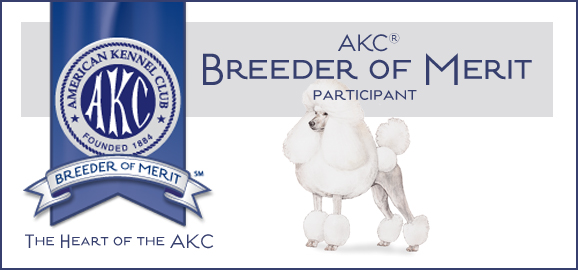
American Kennel Club Bred with H.E.A.R.T. Program:
An AKC Bred with H.E.A.R.T. breeder makes an on-going commitment to the health and well-being of purebred dogs by committing to these program requirements:
- HEALTH: Certifying that their breeding stock is health tested in accordance with the recommendations of their breed’s AKC Breed Parent Club.
- EDUCATION: Promising that they will pursue AKC-provided or AKC-approved continuing breeder education so that they stay educated on the best breeding practices, including advances in canine health.
- ACCOUNTABILITY: Agreeing to comply with the AKC Care and Conditions Policy, including inspections by the AKC, and promising to share health testing and continuing education documentation with AKC.
- RESPONSIBILITY: Accepting responsibility for the health and well-being of the puppies they produce and for complying with all laws regarding the ownership and maintenance of dogs.
- TRADITION: Upholding the AKC’s tradition of breeding purebred dogs that are happy and healthy.
OUR BELOVED SPFL PETS
Our dogs are screened for every standard poodle disease that can be DNA tested. We choose to perform hip, eye and cardiac evaluations before breeding, as well as a baseline thyroid at 2 years old (so we can use it for comparison when/if thyroid needs to be tested in the future). We perform annual recertifications for eyes and cardiac before any future breedings. We elect symptomatic tests when conditions present in a dog. We keep detailed medical histories and if a dog in our line is ever diagnosed with Sebaceous Adenitis or Addison’s Disease, we will carefully evaluate and monitor their offspring and err on the side of caution when testing is recommended. We are blessed to have access to generations of medical records on our dogs lines through our mentors and partners which allows us to be as diligent as possible. Each of our dogs has an individual page with a link to their health testing reported to OFA – for example, check out Katie‘s OFA link on her page.
Health testing is a core pillar of our program, along with structure, temperament and environment. Each pillar is equally important for us, our program, our own pets, and for the sake of our puppies’ future homes/families. Feel free to ask us any questions about our program, what it means to us and what it entails.
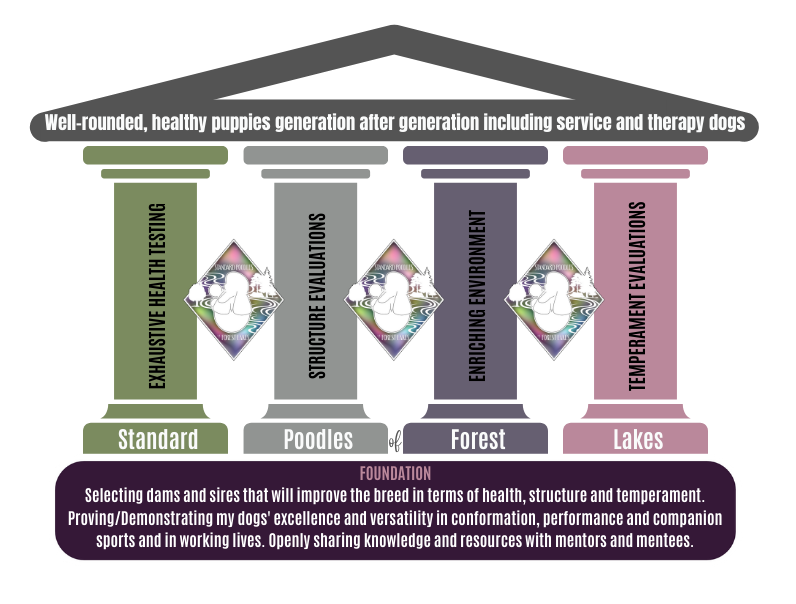
HEALTH INFORMATION
Miniature and Toy Poodles
These are the published OFA requirements for Miniature and Toy Poodles and should be completed before breeding (at minimum):
- Hip X-Rays – OFA or PennHip evaluation for miniatures only (OFA must be done after dog reaches 24 months, PennHip after 4 months, for certification that is valid for the life of the dog)
- Eye Examination – ACVO Ophthalmologist exam (eye exam certification is good for 12 months from the date of the exam)
- Patellar Luxation – Veterinary Evaluation of Patellar Luxation (minimum 12 months)
- Progressive Retinal Atrophy – DNA-based prcd-PRA test from an approved laboratory
The following DNA tests are STRONGLY recommended:
- Von Willebrand Disease 1 (vWD1) Miniatures only
- Degenerative Myelopathy (DM) Miniatures only, optional for Toys
- Progressive Retinal Atrophy, Progressive Rod-Cone Degeneration (PRA-prcd)
- Progressive Retinal Atrophy, Rod-Cone Dysplasia 4 (PRA-rcd4)
- Osteochondrodysplasia Miniatures only
- Chondrodystrophy (CDDY/IVDD) (optional if any intervariety in pedigree)






